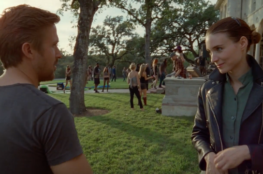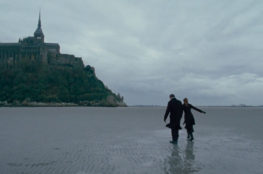Just to be clear, this is not a formal review of Martin Scorsese’s Silence, which is being released nationwide today. Quite by accident, I had the opportunity last night to attend a preview screening of the film hosted by John Loeks, Jr., the owner and operator of the highly successful Celebration Cinema theater chain in West Michigan. The screening, which was attended primarily by Protestants of various stripes and featured an after-viewing discussion facilitated by Calvin College’s Carl Plantinga, provided not only an opportunity for me to witness how a master filmmaker handled one of the most unsettling and contentious novels I have ever read, but a chance to see first-hand how emaciated American Protestantism has become. Keep in mind that West Michigan is no secular outlier; it is home to both the Christian Reformed Church and the Reformed Church of America, along with countless evangelical sects and mega-churches. As recently as a decade or so ago, West Michigan was identified as the second most conservative area in the United States—just behind Salt Lake City, Utah. Whatever our faults (and there are plenty of them), a lack of Jesus isn’t one of them.
In both my casual conservations with the screening’s attendees and the audience-wide discussion itself, I found myself unsettled by how easily the heroic ideal of mission is reduced to a vague notion of “service.” One audience member, who not surprisingly is involved in interfaith dialogue, declaredly proudly that the message of Silence is about setting aside pride, particularly the pride of believing one knows “the truth.” In absolute defiance of the film’s brutal depiction of heroic martyrdom, this gentleman lauded the “enlightenment” of contemporary missionaries who go abroad not to “convince others” but to engage in public works. While missionary activity has long been connected with education, charitable giving, and even bottom-up social renewal, at the heart of all true missionary activity—particularly the Tridentine missionary activity of the Society of Jesus in the 16th and 17th centuries—is the salvation of souls. I dare say that some thought I was an alien from another world when I suggested that Jesuits once went forth to win souls for Christ, not spread multiculturalism.
If the aforementioned gentleman’s comments were an aberration, I’d think nothing of it. Sadly, that wasn’t the case. Almost without exception, every audience remark was pregnant with religious liberalism and the belief that Scorsese’s movie—just like the novel it is based on—gloriously preaches indifferentism. How that shoddy interpretation squares with the martyric witness of simple peasants is quite beyond me. Beyond me as well is the sense that many in the audience got that Endo’s story is about the spreading of neutered Christianity unmoored from a concrete Church rather than Catholicism. And at least on this point, one audience member (a professor at Calvin College) suggested that the movie’s meaning is likely to be more apparent to Catholics than Protestants. In replying to her, I was tempted to say something about iconoclasts, but I resisted.
There’s no need for me to repeat every scandalous opinion put forth. However, after leaving the theater, I spent a good 15-30 minutes going over the film in my head, wondering if I hadn’t been too quick to read the Catholic Faith into a film that many apparently understood as a lesson in why it’s important to hold hands and sing “Kumbaya” around a campfire rather than ask the only question ever worth asking, “What think ye of Christ?”
Although subsequent viewings may dislodge this belief, I remain convinced that whether by accident, design, or a bit of both, Scorsese’s Silence is neither an apologia for apostasy nor panegyric to cultural relativism. That doesn’t mean it’s an easy film. Some concerned Catholics have suggested the film, like the book, is theologically dangerous—and to some extent they’re right. Any artistic achievement that attempts to wrestle with the most difficult tenets of the Faith risks obscuring more than it clarifies. By raising difficult questions without ready-made, manulist answers, Silence inadvertently invites idiotic replies. But more than that, it offers an opportunity to reflect on the fragility of faith and the hard truth that God’s apparent silence is more often than not our obstinate refusal to listen.



January 13, 2017
Look at it from the other side. I’ve read comments elsewhere online that were glad that Japanese ruthlessly suppressed Catholicism because…*drumroll*… Catholicism is bad.
January 14, 2017
Well, considering that both the Franciscans and the Jesuits were in Japan as rivals, representing Portugal and Spain, and that Oda Nobunaga had been interested in manipulating that rivalry in his quest to dominate Japan, the response of Hideyoshi and Tokugawa was understandable if deplorable.
January 14, 2017
As I recall, British and Dutch traders deliberately stoked anti-Christian sentiment among Japan’s ruling class, and pointed to the Phillipines as something they could expect if they allowed the Catholic missions to go on. The Protestants basically said, “You can trust us, we’re just here to make money, not convert anyone.”
January 19, 2017
You may choose to interpret The Silence as being about “glorious martyrdom,” but since the film’s protagonist and the character played by the biggest star both apostacize, you would be sorely mistaken. This is especially true since the film doesn’t clearly imply that their apostacization was wrong. What you have mistaken for protestant liberalism in the comments post-film, are likely a reflection of your own misunderstanding of the film’s questioning stance.
You did not hear the music, brother.
January 24, 2017
The author doesn’t suggest it’s about “glorious martyrdom” (indeed, why put the words in quotes? They appear together nowhere in the post), but about faith. It, of course, doesn’t “clearly imply [apostasy] is wrong,” it simply refrains from judgment of a man in a difficult situation: nevertheless, it very clearly implies the apostasy is a serious loss, as evidenced by the shrouding of the face of Christ in the moment before Rodriguez tramples on the image of Christ.